Tag Archives: National Oceanic and Atmospheric Administration
A true story, but ever so fishy…
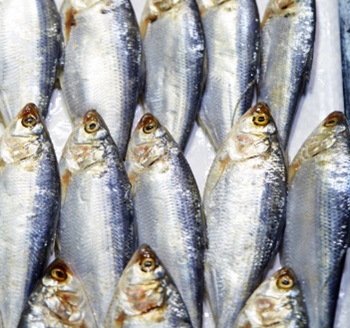 You may have heard of Chevron, the huge oil and gas company and probably one of the biggest oil producers in the world. But you may not have heard of the “Chevron deference” justified by congressional agencies. This became an unspoken government policy some 40 years ago. Here is the unspoken protocol. Congress would legislate a new, ambiguous bill to “fix” an issue. The enacted law was then passed to one of the agencies such as the FDA, EPA, USDA, or if there wasn’t a specific agency, a new one was formed. The purpose was to formulate government policy using the new law. An example is when President Jimmy Carter formed the Department of Energy in 1977. Reportedly it was to plan strategies to conserve energy and develop alternative energy sources. I will let readers form their own opinions in this time of shifting energy strategies. Yet 40 some years later, it almost all falls back on using fossil fuels. Let’s face it. Windmills and solar panels aren’t the long-term solution. more, >>CLICK TO EAD<< 07:03
You may have heard of Chevron, the huge oil and gas company and probably one of the biggest oil producers in the world. But you may not have heard of the “Chevron deference” justified by congressional agencies. This became an unspoken government policy some 40 years ago. Here is the unspoken protocol. Congress would legislate a new, ambiguous bill to “fix” an issue. The enacted law was then passed to one of the agencies such as the FDA, EPA, USDA, or if there wasn’t a specific agency, a new one was formed. The purpose was to formulate government policy using the new law. An example is when President Jimmy Carter formed the Department of Energy in 1977. Reportedly it was to plan strategies to conserve energy and develop alternative energy sources. I will let readers form their own opinions in this time of shifting energy strategies. Yet 40 some years later, it almost all falls back on using fossil fuels. Let’s face it. Windmills and solar panels aren’t the long-term solution. more, >>CLICK TO EAD<< 07:03
Alaska’s seafood industry lost $1.8 billion last year, NOAA report says
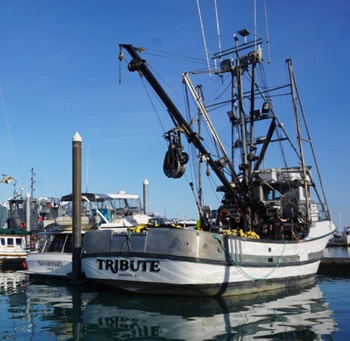 A variety of market forces combined with fishery collapses occurring in a rapidly changing environment caused Alaska’s seafood industry to lose $1.8 billion from 2022 to 2023, a new federal report said. The array of economic and environmental challenges has devastated one of Alaska’s main industries, said the report, issued by the National Oceanic and Atmospheric Administration. And the losses extend beyond economics, casting doubt on prospects for the future, the report said. The losses also extend beyond Alaska. Nationwide, Alaska’s seafood industry woes caused the loss from 2022 to 2023 of more than 38,000 jobs and a $4.3 billion decline in total U.S. output, the report said. There was also a loss of $269 million in combined state and local tax revenues, the report said. The states most affected beyond Alaska were those on the West Coast. The report breaks down the dollar losses. more, >>CLICK TO READ<< 10:14
A variety of market forces combined with fishery collapses occurring in a rapidly changing environment caused Alaska’s seafood industry to lose $1.8 billion from 2022 to 2023, a new federal report said. The array of economic and environmental challenges has devastated one of Alaska’s main industries, said the report, issued by the National Oceanic and Atmospheric Administration. And the losses extend beyond economics, casting doubt on prospects for the future, the report said. The losses also extend beyond Alaska. Nationwide, Alaska’s seafood industry woes caused the loss from 2022 to 2023 of more than 38,000 jobs and a $4.3 billion decline in total U.S. output, the report said. There was also a loss of $269 million in combined state and local tax revenues, the report said. The states most affected beyond Alaska were those on the West Coast. The report breaks down the dollar losses. more, >>CLICK TO READ<< 10:14
The number of fish on US overfishing list reaches an all-time low. Mackerel and snapper recover
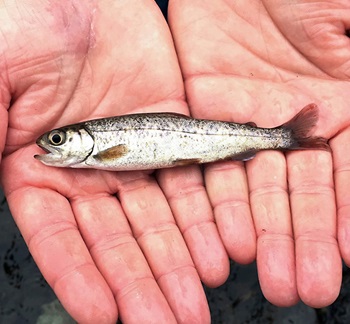 The National Oceanic and Atmospheric Administration released an updated analysis of American fisheries late last week via its annual “Status of the Stocks” report, which provides an assessment of the populations of the seafood species fishermen catch and customers buy. The report states that 94% of fish stocks are not subject to overfishing, which is slightly better than a year ago. The U.S. was able to remove several important fish stocks from the overfishing list, NOAA said in a statement. They include the Gulf of Maine and Cape Hatteras stock of Atlantic mackerel and the Gulf of Mexico stock of cubera snapper. more, >>CLICK TO READ<< 09:33
The National Oceanic and Atmospheric Administration released an updated analysis of American fisheries late last week via its annual “Status of the Stocks” report, which provides an assessment of the populations of the seafood species fishermen catch and customers buy. The report states that 94% of fish stocks are not subject to overfishing, which is slightly better than a year ago. The U.S. was able to remove several important fish stocks from the overfishing list, NOAA said in a statement. They include the Gulf of Maine and Cape Hatteras stock of Atlantic mackerel and the Gulf of Mexico stock of cubera snapper. more, >>CLICK TO READ<< 09:33
Inoperable weather buoys at mouth of the Columbia River stir concern
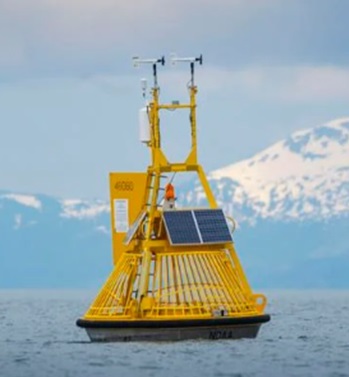 On the first day of commercial Dungeness crab season, Kelsey Cutting began his morning the way most crab fishermen do: checking the weather. Like many commercial fishermen, Cutting relies on data from weather buoys at the mouth of the Columbia River to guide his decisions. But as he’s learned, not all weather buoys are created equal — and when one goes out, there can be serious consequences. The National Oceanic and Atmospheric Administration operates two buoys at the mouth of the river that track real-time data on barometric pressure, wind direction, speed and gust, air and sea temperature, humidity and waves, which help inform National Weather Service forecasts. The buoys have been out of operation since late last year. more, >>click to read<< 15:18
On the first day of commercial Dungeness crab season, Kelsey Cutting began his morning the way most crab fishermen do: checking the weather. Like many commercial fishermen, Cutting relies on data from weather buoys at the mouth of the Columbia River to guide his decisions. But as he’s learned, not all weather buoys are created equal — and when one goes out, there can be serious consequences. The National Oceanic and Atmospheric Administration operates two buoys at the mouth of the river that track real-time data on barometric pressure, wind direction, speed and gust, air and sea temperature, humidity and waves, which help inform National Weather Service forecasts. The buoys have been out of operation since late last year. more, >>click to read<< 15:18
The Supreme Court can save working fishermen from Biden regulators
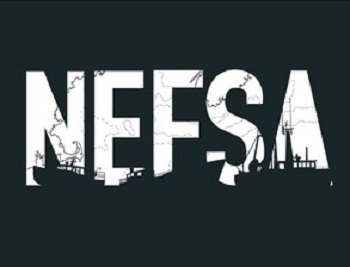 The crew and I had been trawling the Gulf of Maine for several days aboard the F/V Teresa Maria IV, the commercial fishing vessel I captained for 14 years. I had only just settled into my bunk for a few hours of sleep. That’s when the rogue wave hit. Life at sea is never predictable. A promising forecast could give way at any time to a squall with heavy swells. Essential navigation components might break. On that night, circumstances coalesced such that a rogue wave knocked my boat clean over. We were capsized in the black of night. This unsettling experience was front of mind when my organization, the New England Fishermen’s Stewardship Association (NEFSA) filed an amicus brief in an upcoming Supreme Court case about the Biden administration’s power over the fishing industry. photos, more, >>click to read<< 06:46
The crew and I had been trawling the Gulf of Maine for several days aboard the F/V Teresa Maria IV, the commercial fishing vessel I captained for 14 years. I had only just settled into my bunk for a few hours of sleep. That’s when the rogue wave hit. Life at sea is never predictable. A promising forecast could give way at any time to a squall with heavy swells. Essential navigation components might break. On that night, circumstances coalesced such that a rogue wave knocked my boat clean over. We were capsized in the black of night. This unsettling experience was front of mind when my organization, the New England Fishermen’s Stewardship Association (NEFSA) filed an amicus brief in an upcoming Supreme Court case about the Biden administration’s power over the fishing industry. photos, more, >>click to read<< 06:46
Ecosystem reports show continuing effects of warming in Alaska’s marine waters
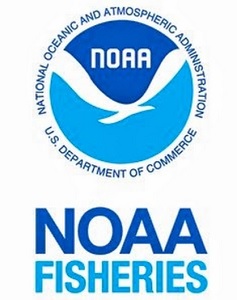 The waters off Alaska’s Aleutian Islands registered the warmest winter temperatures in over a century, part of a decade-long period of warming, according to a report issued by the National Oceanic and Atmospheric Administration. The Aleutians report is one of three annual ecosystem status reports issued by NOAA Fisheries for marine areas of Alaska. The reports, compiled by large teams of scientists, were released earlier this month and presented to the North Pacific Fishery Management Council, the panel that sets regulated commercial fishing in federal waters off Alaska. The Bering Sea remains warmer than the long-term average, though it has cooled since the heatwaves, NOAA Fisheries biologist Elizabeth Siddon told the North Pacific Fishery Management Council in her presentation of the report. more, >>click to read<< 07:53
The waters off Alaska’s Aleutian Islands registered the warmest winter temperatures in over a century, part of a decade-long period of warming, according to a report issued by the National Oceanic and Atmospheric Administration. The Aleutians report is one of three annual ecosystem status reports issued by NOAA Fisheries for marine areas of Alaska. The reports, compiled by large teams of scientists, were released earlier this month and presented to the North Pacific Fishery Management Council, the panel that sets regulated commercial fishing in federal waters off Alaska. The Bering Sea remains warmer than the long-term average, though it has cooled since the heatwaves, NOAA Fisheries biologist Elizabeth Siddon told the North Pacific Fishery Management Council in her presentation of the report. more, >>click to read<< 07:53
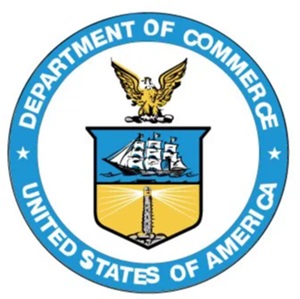
Struggling salmon fishermen getting federal help, but it may be too late
Earlier this month, two years after a request by Oregon’s governor, the U.S. Department of Commerce declared a Chinook fishery disaster for 2018, 2019 and 2020, years when local salmon populations plummeted. Fishing regulators blame the drop on poor habitat conditions and climate change near the California-Oregon border, where thousands of Chinook migrate from the ocean up rivers and streams to spawn. The disaster declaration releases financial assistance for fishermen and possibly for other businesses, along with funding to help restore the fishery and protect future Chinook runs, members of Oregon’s congressional delegation said in a statement. “The powers that be move pretty slowly when it comes to this stuff,” said Ray Monroe, a Pacific City dory fisherman. >>click to read<< 12:00
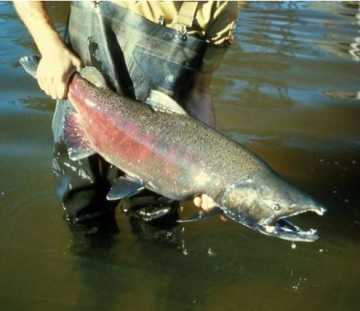
With salmon at risk of extinction, California begins urgent rescue effort
Typically, now is the time when creeks along the Sacramento River are filled with young spring-run Chinook salmon preparing to make their journey downstream to the Pacific Ocean, where they will mature, and eventually make their return to California spawning sites. This year, however, the salmon population has plummeted alarmingly—what officials call a “cohort collapse”—and biologists are taking urgent measures to save them from extinction. For the first time, biologists with the California Department of Fish and Wildlife and the National Oceanic and Atmospheric Administration have begun capturing the juvenile spring-run salmon so that they can breed them in captivity, and hopefully prevent them from disappearing from the wild. For the first time, biologists with the California Department of Fish and Wildlife and the National Oceanic and Atmospheric Administration have begun capturing the juvenile spring-run salmon so that they can breed them in captivity, and hopefully prevent them from disappearing from the wild. >>click to read<< 13:25
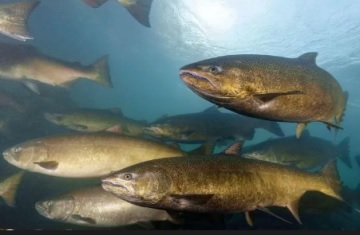
Oregon fishing disaster declared after failure impacting Chinook Salmon
Oregon Gov. Tina Kotek announced Friday that a fishing disaster has been declared following a three-year commercial fishery failure in the state. The declaration comes after U.S. Secretary of Commerce Gina Raimondo determined that a commercial fishery failure occurred in 2018, 2019 and 2020 because of a fishery resource disaster impacting Oregon Chinook Salmon Fisheries, the governor said. The determination comes after a request from former Gov. Kate Brown in October 2021. Fisheries with disaster determinations are eligible for funding from fishery disaster appropriations to help with community recovery, fishery restoration and prevention of future disasters. >>click to read<< 17:00

Mass DMF’s On-Demand Fishing Gear Economic Modeling Report Released
The Massachusetts Division of Marine Fisheries (DMF) has completed the second phase of a two-year project, funded by the National Fish and Wildlife Foundation in partnership with the National Oceanic and Atmospheric Administration, to develop the first-of-its-kind evaluation of the operational costs of on-demand fishing gear technology by Massachusetts lobster fishermen. On-demand fishing gear, commonly known as ropeless fishing gear, replaces traditional vertical buoy lines, which can result in entanglements with marine mammals including North Atlantic right whales, with new gear retrieval and marking methods. Most on-demand fishing gear systems consist of submerged buoyancy devices that are activated using time-release mechanisms or acoustic signals transmitted from the surface. Click the links inside for the report. >click to read< 15:47

We’re Being Regulated Out of Business, New England Fishermen Say
“The New England fishermen are the most regulated fishermen in the world,” Jerry Leeman says. Leeman has been fishing in Maine his entire life. His father, grandfather, and great-grandfather were all fishermen. Federal regulations have now reduced the amount of haddock landings for commercial fishermen by more than 80%, Leeman said. The reduction in fish that fishermen are allowed to catch and “offshore wind development,” which is taking over “just under 10 million acres” of ocean, prompted Leeman, along with fisherman Dustin Delano, to create the New England Fishermen’s Stewardship Association to advocate for the region’s fishermen. Video, listen to the podcast >click to read< 07:55
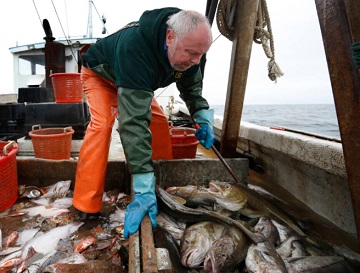
Mega Cut: Haddock, a staple Atlantic fish, is in decline off New England, regulators say
A recent scientific assessment found that the Gulf of Maine haddock stock declined unexpectedly, and that meant the catch quotas for the fish were unsustainably high, federal fishing managers said. “We seem to find plenty, but they can’t,” said Terry Alexander, a Maine-based fisher who targets haddock and other species. “It’s a disaster is what it is. A total, complete disaster.” The fishery management council mandated the 84% reduction in catch quotas for the current fishing year, which started May 1. The change applies to fishers who harvest haddock from the Gulf of Maine, a body of water off Massachusetts, New Hampshire and Maine. Fishers also harvest from Georges Bank, a fishing ground to the east where quotas were also reduced for this year, including adjoining areas overseen by Canadian officials who issued their own major cuts. >click to read< 08:02
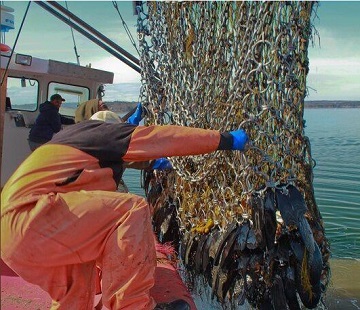
Scallop season winds down
As the state’s commercial scallop season winds to a close, federal regulators on April 1 decreased the amount that draggers can land in 2023 in the Northern Gulf of Maine by 25,000 pounds. Total landings for the NGOM for 2023 are 434,311 pounds, the National Oceanic and Atmospheric Administration (NOAA) announced March 31 as part of its overall NGOM Management Plan for 2023. Vessels are limited to possessing 1,666 pounds of in-shell scallops. NOAA had closed the NGOM scallop fishery on May 26, 2022, when its quota had been landed, effective through March 31 of this year, with Maine and Massachusetts vessels exempted if they were exclusively fishing in state waters. >click to read< 16:28
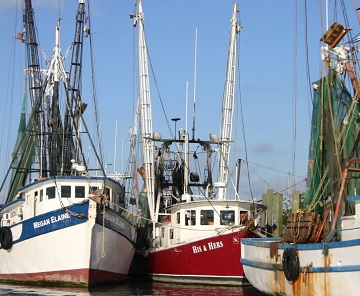
Louisiana denounces federal rule for shrimp boats at Fifth Circuit
The small shellfish are big business in Louisiana with 15,000 residents employed in the industry, which has an annual economic impact of $1.3 billion for the state, according to its Seafood Promotion and Marketing Board. But Louisiana shrimpers who followed their fathers and grandfathers into the trade say it is dying as wild-caught and farm-raised imports from Thailand, Vietnam, Indonesia and India into the U.S. have exceeded 1 billion pounds annually in recent years. Since 1987, the National Marine Fisheries Service has required shrimp trawlers in some circumstances to install turtle excluder devices, which separate sea turtles, sharks and other large bycatch so they can escape through an opening in the netting. >click to read< 09:52
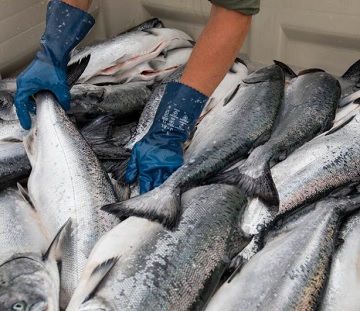
Poor outlook for king salmon could shut down California’s sport and commercial seasons
This year’s official “forecast abundance” estimates that just 169,767 adult chinook salmon are waiting off shore to be caught — a substantial decrease from the 396,458 predicted last year and forecasts above 800,000 a decade ago. A nearly 2-month delay in the Dungeness crab season this year meant commercial crabbers missed the Thanksgiving, Christmas and New Year’s holidays and then had a glut of fresh crab available when the market was weak, said veteran fisherman Dick Ogg, vice president of the Bodega Bay Fisherman’s Marketing Association, which represents the local commercial fleet. Though Ogg participates in a variety of fisheries, many locals only do salmon, crab or both. “For the guys that only have salmon as a potential income, it’s going to be devastating,” he said, “and for the guys who have salmon and crab, and who have had a minimal crab season, it’s going to be devastating.” >click to read< 09:05
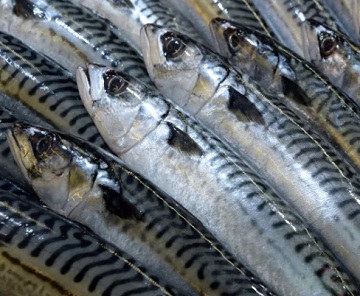
U.S. announces reduced East Coast commercial mackerel quota for 2023
The United States will proceed with a commercial fishery of the depleted East Coast mackerel stock it shares with Canada in 2023. The U.S. quota was released this week, putting pressure on Canada which has yet to decide whether it will continue a total moratorium it imposed in 2022 to help rebuild the population. The National Oceanic and Atmospheric Administration, the U.S. equivalent of the Fisheries and Oceans Canada (DFO), announced on Tuesday a total allowable catch of 3,639 metric tonnes. It was 27 per cent cut from 2022 in recognition that the transboundary stock remains in trouble and is overfished. >click to read< 19:01
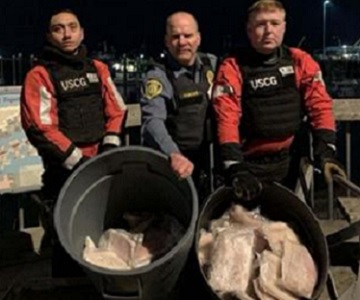
Busted! – Coast Guard, NOAA seize illegally caught fish near Homer, Alaska
A Coast Guard law enforcement boarding team seized illegally caught fish near Homer, Alaska, Wednesday. The Naushon crew seized the catch and escorted the vessel to Homer where a NOAA OLE representative took possession of the catch upon arrival at the pier. A Coast Guard Cutter Naushon boarding team discovered halibut aboard a commercial IFQ halibut vessel that was not documented in the vessel’s logbook. Additionally, the halibut was filleted to where the size and number of fish could not be determined. >click to continue< 15:49

Draft North Atlantic Right Whale and Offshore Wind Strategy Announced
As the Bureau of Ocean Energy Management (BOEM) has ramped up offshore wind development to meet the Biden-Harris administration’s goal of generating 30 gigawatts of offshore wind by 2030, the question of how the expansion of offshore wind energy could affect the critically endangered North Atlantic right whale (NARW) has come under close review. To help address this question and support the recovery of endangered NARW and the responsible development of offshore wind energy, BOEM and the National Oceanic and Atmospheric Administration’s National Marine Fisheries Service (NOAA Fisheries) developed a joint Draft North Atlantic Right Whale and Offshore Wind Strategy (the Draft Strategy). >click to read< 11:29
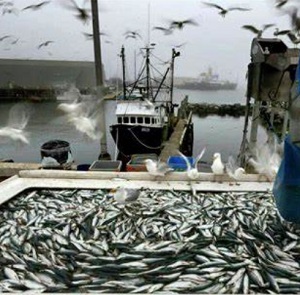
Fishermen take case against paying for monitors to SCOTUS
“Making these vessels pay to have the observer coverage on them just decreases hardworking fishermen’s wages and makes it less attractive for vessels to continue,” said Wayne Reichle, president of Lund’s Fisheries of New Jersey and an owner of two of the boats that are plaintiffs in the case. “In some cases, it prevents them from fishing.” The fishermen have made the case that Congress never gave federal regulators the authority to require the expense of paying for the monitors. The price of at-sea monitoring, and who must pay for it, is a longstanding source of tension between commercial fishermen and regulators. >click to read< 21:01

Lobstermen may get temporary delay on new right whale restrictions
The lobster industry, National Oceanic and Atmospheric Administration, and the Center for Biological Diversity are involved in federal court negotiations over imposing new and tougher restrictions on fishing. The CBD brought a suit against the federal agency, arguing the rules imposed earlier this year don’t do enough to protect the endangered whales, as required by federal law. The National Marine Fisheries Service, which is part of NOAA, said it needed two years, while the CBD suggested just six months,,, >click to read< 08:57
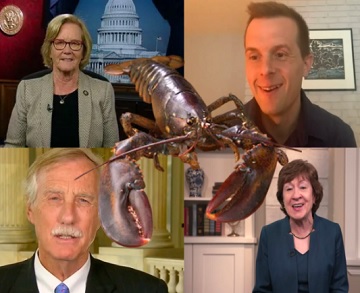
Maine Congressional delegation backed HUGE spending increases for agency threatening lobster industry
Maine’s congressional delegation has voted to increase funding for the National Oceanic and Atmospheric Administration’s (NOAA) by more than $6 billion under Democratic President Joe Biden. NOAA has come under increased scrutiny in Maine as the result of a series of regulatory actions aimed at limiting lobster fishing in the Gulf of Maine. Maine’s lobstering industry, already pressed by low prices for their catch, has been raising hell at public meetings. The recent NOAA spending increases were contained in the fiscal year 2022 appropriations bill, Biden’s massive infrastructure spending bill, and the so-called “Inflation Reduction” Act. Maine’s entire congressional delegation voted in favor of all of these bills, with the exception of Sen. Susan Collins’ vote against the IRA. The bill increased NOAA’s funding from the previous year by $447 million. >click to read< 10:04

Maine’s leaders seek more time on whale protection rules
Maine Gov. Janet Mills is seeking to delay new federal whale protection rules, citing fears the state’s commercial lobstermen won’t be able to comply. In a letter to Commerce Secretary Gina Raimondo, Mills urges federal fisheries regulators to extend the period for collecting public comment on the new regulations, which are aimed at protecting critically endangered north Atlantic right whales by setting a seasonal closure and requiring modifications to gear. Mills said she believes it is “unconscionable” that the National Oceanic and Atmospheric Administration only plans to hold one remote public hearing on the new regulations, which call for reducing by 90% the number of Atlantic Coast fixed gear fisheries, including lobster industry. >click to read< 15:14
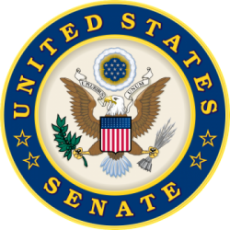
S.497 would establish the American Fisheries Advisory Committee within Department of Commerce
After reaching out to Senator Ed Markey and Senator Elisabeth Warren and informing them that under NOAA, the SKG Grant money was not going to our fisherman as intended. My experience of being on a panel in Saint Petersburg to evaluate the applicants for two days, I discovered that the panel was there to please the public and that NOAA has complete say of who got the money! I reported this to Bruce Schactler, and Senator Sullivan. Markey who was opposed, sent his aid to met with me. After I told her what happened Markey came on board and it will now go to the House of Representatives. I am asking all Senators to support this bill. It will set up an advisory panel as was in 1954 and give our fisherman a better chance of the funds. Please, >click to read< Best Regards, Sam Parisi
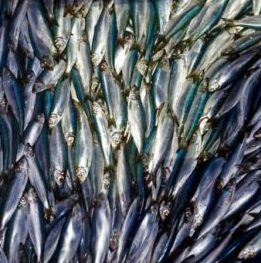
Fishermen sue to end industry funded monitoring program
A group of fishing companies in New England is bringing its bid to try to end industry-funded monitoring programs to federal appeals court. The companies are part of the industry that harvests Atlantic herring, which are heavily fished off the East Coast. The federal government requires herring fishing boats to participate in, and pay for, at-sea monitoring programs. >click to read< 13:30
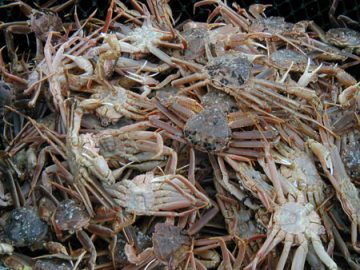
Valuable crab populations are in a ‘very scary’ decline in warming Bering Sea
The forecast for the 2022 winter snow crab season is bleak. At best, it is expected to be considerably less than 12 million pounds. That would be down from a 2021 harvest of 45 million pounds,,, The iconic Bering Sea red king crab, which can grow up to 24 pounds with a leg-span up to 5 feet, also are in trouble. In a big blow to the commercial crabbers, many of whom are based in Washington, the October harvest for these crab has been canceled, something that has only happened three times before. Overall conservation measures are expected to wipe out most of the value of the annual Bering Sea crab harvest, worth more than $160 million during the past year, according to Jamie Goen, executive director of the Seattle-based Alaska Bering Sea Crabbers. >click to read< 13:54

Lobster Fishing Association Files Lawsuit Against NOAA Whale Plan
A lobster fishing group based in Maine filed a lawsuit against the federal government on Monday charging new rules designed to protect whales are not based on the best available science. National Oceanic and Atmospheric Administration announced the rules, designed to protect North Atlantic right whales, in August.,, The Maine Lobstermen’s Association has pushed back against the rules,,, >click to read< 11:27

Fishermen in NCLA Video Explain the Need to Reel in NOAA’s at-Sea Monitor Rule
The New Civil Liberties Alliance released a video today outlining why it is unconstitutional to force Atlantic herring fishermen to fund government-mandated monitors at sea. It is “the equivalent of having a cop in your car who’s policing you while you drive, and you have to pay his salary out of your own pocket,” said Meghan Lapp, Fisheries Liaison & General Manager for Seafreeze, Ltd. about the rule being challenged in Relentless Inc., et al. v. U.S. Dept. of Commerce, et al. NCLA, a nonpartisan, nonprofit civil rights group, represents these private fishing companies,,, The at-sea monitor mandate, issued in 2018, is unlawfully “industry-funded.” >click to read< 08:50

Coast Guard halts illegal use of “paper captains” in WA-based tuna fishing operation
Since 2019, Coast Guard personnel, working collaboratively with CBP and NOAA agents, detected eight separate “paper captain” violations operating in the Pacific Northwest. Paper captain is a term applied to an individual listed on documents as a U.S.-flagged vessel’s captain but in actuality serves as a deckhand or in a similar lower‐level capacity. Thus far, one Washington-based fishing fleet has paid $9,150 in civil penalties and has been cited for $140,000 in additional penalties still pending adjudication. >click to read< 17:54




































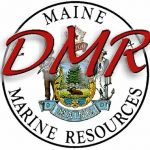

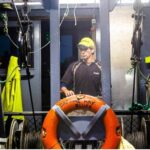
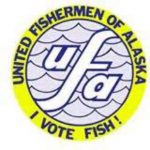
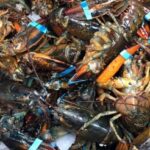
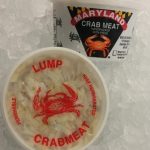



Reader Commentary: NOAA cares about whales — until wind farms are involved
Share this post